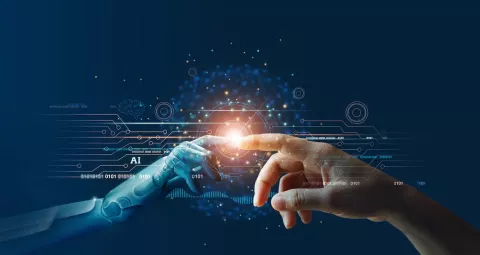How AI Will Shape the Future of HR Management

Artificial Intelligence (AI) is no longer a distant concept—it’s already transforming the way businesses operate. In the field of Human Resource Management (HRM), AI is opening new possibilities for efficiency, personalization, and strategic decision-making. From automating repetitive tasks to predicting workforce trends, AI will reshape HR as we know it.
1. Automating Routine HR Tasks
HR professionals spend a significant amount of time on administrative work: scheduling interviews, processing leave requests, or updating employee records. AI-driven systems can handle these tasks automatically, freeing HR teams to focus on strategic priorities such as employee engagement and organizational growth.
Example: AI chatbots can answer employee FAQs about policies, benefits, or holidays instantly, reducing the workload on HR staff.
2. Smarter Recruitment and Talent Acquisition
Recruitment is one of the areas where AI shows the most promise. AI algorithms can:
- Screen resumes faster by matching skills with job descriptions.
- Reduce bias by focusing on data-driven criteria rather than human assumptions.
- Predict candidate success by analyzing historical performance data.
This leads to shorter hiring cycles, better cultural fits, and improved retention rates.
3. Personalized Employee Learning and Development
AI can make training more adaptive by recommending courses tailored to each employee’s role, skills, and career goals. Instead of generic training sessions, employees receive personalized learning paths that evolve over time based on performance and feedback.
This not only improves skill-building but also increases engagement by showing employees that the organization invests in their growth.
4. Predictive Analytics for Workforce Planning
AI enables HR leaders to forecast workforce needs with greater accuracy. By analyzing data such as turnover rates, seasonal demand, and employee performance, AI can predict potential gaps in staffing and suggest proactive solutions.
For example, predictive models can highlight which employees are at risk of leaving, giving HR the chance to intervene with retention strategies before it’s too late.
5. Enhancing Employee Engagement and Wellbeing
AI tools can analyze employee sentiment by monitoring surveys, communication channels, and performance trends. This provides HR leaders with real-time insights into morale and engagement levels.
For instance, if engagement scores dip in a specific department, AI can flag this early so managers can take corrective action before problems escalate.
6. Improving Diversity and Inclusion
Bias in hiring and promotions has long been a challenge in HR. AI can help reduce human bias by standardizing decision-making processes. When trained correctly, AI tools focus on qualifications, performance, and potential, rather than unconscious human preferences.
7. The Ethical and Human Side of AI in HR
While AI brings immense opportunities, it also raises ethical concerns. Questions about data privacy, algorithmic bias, and over-reliance on automation must be addressed. HR leaders need to ensure transparency, fairness, and accountability when deploying AI tools.
AI should augment, not replace, the human touch in HR. Empathy, creativity, and complex problem-solving are uniquely human qualities that technology cannot replicate.
Conclusion
The future of HR management will be deeply intertwined with AI. Companies that adopt AI-driven HR solutions will enjoy faster processes, smarter decisions, and more engaged employees. However, success depends on finding the right balance between automation and human judgment.
AI isn’t about replacing HR professionals—it’s about empowering them to focus on what truly matters: building better workplaces where employees and businesses thrive.
- Log in to post comments


